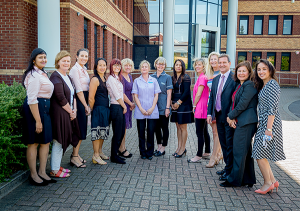The Importance of Supporting Baby Loss Awareness

October 9th -15th plays host to baby loss awareness week. Our whole team here at The Surrey Park Clinic would like to take this opportunity to talk about the importance of supporting those affected by stillbirth and any other devastating event early in an infant’s life.
This includes parents who have lost a child, as well as their families, friends and people close to them who did or would have played an important part in their lives. It is important for everyone to understand why we are supporting baby loss awareness week and how the events and educational opportunities surrounding it can help families in need.
We also understand that talking about such a traumatic event can seem impossible. But while it’s ok to take time to grieve, we also want to be part of the group breaking that silence. It shouldn’t be something people feel they can’t talk about – but be an open conversation for when they are ready.
That’s why we will be sharing stories, information and advice throughout our clinic, social media channels and our blog – encouraging others to speak out and ask for support in these dark times.
What Is Baby Loss Awareness Week?
We are taking part in an annual event that serves the purpose of breaking the silence surrounding this topic and allowing people all over to come together to remember babies who have died and to show their support for families who have been affected.
The Surrey Park Clinic has always worked to become a safe space for everyone. Patients, staff, visitors and everyone in between are our biggest priorities. However, creating this safe space may have started with the clinic, but that is not where it ends.
Conversations supporting baby loss awareness week are being had on social media, via email, over the phone and at our events.
Having the confidence to speak up, ask for help, resources and advice means being able to do so via a platform that makes you feel comfortable. We understand that face-to-face conversations may not be possible for some.
That’s why we have worked to build our online community as well – offering the chance to engage with our posts, Q&As and much more when finding the immediate words is just too difficult. The more we can get other businesses as well as people like you doing the same – the bigger and better the space is going to be for people struggling.
How To Get Involved
There are a number of ways that you can get involved with supporting baby loss awareness week. We have a few ideas below, but remember this is your time to break the silence in a way that feels right for you.
Wave Of Light
If you’ve been following the event for a while, you may be aware of the wave of light campaign. People all over the country take part by lighting a candle at 19:00 on the 15th of October and leaving it burning for at least an hour.
The act serves as a way to remember all of the babies that have passed away and their families. The continuous wave of light represents how our love for these babies never fades and how they will always be in our hearts.
You can get involved by sharing a photo of your candle on social media using the hashtag #WaveOfLight. Or, you can of course take the time privately to reflect.
Pink & Blue
During the week, you will see a lot of social media posts using these colours as well as people wearing ribbons and bows.
These are the dedicated colours for supporting baby loss awareness and some businesses or local landmarks will even light up buildings in these colours to show their support – spreading the message as far as possible.
You can get involved by tying a pink or blue ribbon to your car antenna or handbag. Or, if you’re feeling crafty – make some to give out to friends, family and colleagues!
Take a walk around your local town during this week and see how many lights you can spot. We know that there will be a few around Guildford, so keep your eyes peeled!
Talk About It
This is probably the most important way that you can get involved. Break the silence surrounding baby loss by talking about it with those around you.
If someone close to you has been affected by baby loss, offer your support in any way you can. This might be by just being there to listen, giving them a hug or even attending events with them.
If you don’t know anyone who has been affected, start a conversation about it with friends or family. The more we talk about baby loss, the more normalised the topic will become – making it easier for those going through it to speak out.
Professional Training With SANDS
SANDS is a charity we’ve supported before at The Surrey Park Clinic. They are dedicated to supporting anyone affected by the death of a baby, as well as working to improve the care and experience that bereaved parents receive.
As part of their work, they offer free professional training courses for those who want to learn more about supporting others through baby loss. The courses are open to anyone who works with bereaved parents or families, including but not limited to
– GPs
– Health Visitors
– Midwives
– Doulas
– Bereavement Counsellors/Support Workers
– Social Workers/Carers.
Our staff regularly undertake these training opportunities and many have commented on how enlightening they are. It gives us a different perspective to carry through our roles here at the clinic.
We’d highly recommend that anyone working in the industry has a go at these courses. They’re brilliantly put together and SANDS have even said:
“Over the years we have gathered evidence from parents, health professionals and researchers on how to safely support families when a baby dies and what can be done to save babies’ lives in the future. With this evidence, we’ve created a package of training and tools to help professionals offer the best possible care and support.”
Supporting Baby Loss Awareness: Treatments
Daily pressures, trauma, grief and life stage can, at times, make life particularly challenging. Sometimes we can work through these issues with the support of family and friends. However, there are times when many of us benefit from professional help to find ways to deal with challenging times or problems like baby loss.
We are lucky enough to be able to offer psychotherapy at the clinic and have a number of expert clinicians who can help work through grief, finding a way to break the silence that works for you.
If you are struggling and would like to talk to someone, please do not hesitate to get in touch. No parent enters a pregnancy expecting a loss and the consequences can be devastating. From self-blame and guilt to depression and suicidal thoughts – there comes a time when professional support and advice is needed to guide someone through.
Benefits of Psychotherapy
Firstly, it can be hard to deal with the stigma surrounding the topic. Many parents have gone through this heartbreak, only to find a dismissive friend, family member or even healthcare professional at the end of the phone.
Our clinicians’ first aim is to validate the feelings that come with grief. After that, supporting baby loss awareness is all about affirming your previous steps as well as the ones to come.
By doing so, we hope to leave people feeling more understanding of their individual situations and able to move forward in whatever way suits them. No matter how fast or slow.
As well as this, working with a professional can help avoid an overwhelming feeling or the need to move all at once. Approaching it in an informed manner will make any future actions more sustainable and hopefully, beneficial to you.
It’s not just about addressing your own feelings, but learning how to deal with those around you after an experience as traumatic as this. The world might not seem quite the same for a while and our clinicians are there to help you navigate that at your own pace.
Break The Silence
If you’re reading this and have experienced baby loss, we hope that knowing there are people here to talk to will help encourage you to break the silence.
We understand how difficult it can be and assure you that everyone’s experience is different. Our clinicians tailor their approach specifically to each individual they work with.
Similarly, if you’re close to someone going through a difficult time regarding losing a child, we hope that our blog, social media and other platforms offer the support you need to help them through it.
Baby Loss Awareness Week might not be something you feel comfortable discussing but at Surrey Park Clinic, we feel it’s important to support parents through this tough time however we can.



 traightforward discovering that assisted conception is required, in order to have a family. The information available can be overwhelming and daunting and, at times, it’s difficult to even know where to begin. Infertility most certainly has a language of its own. There’s also an element of hopelessness and despair, when realising that future dreams are dependent on doctors, nurses and medical science, coupled together with a big pinch of luck.
traightforward discovering that assisted conception is required, in order to have a family. The information available can be overwhelming and daunting and, at times, it’s difficult to even know where to begin. Infertility most certainly has a language of its own. There’s also an element of hopelessness and despair, when realising that future dreams are dependent on doctors, nurses and medical science, coupled together with a big pinch of luck.